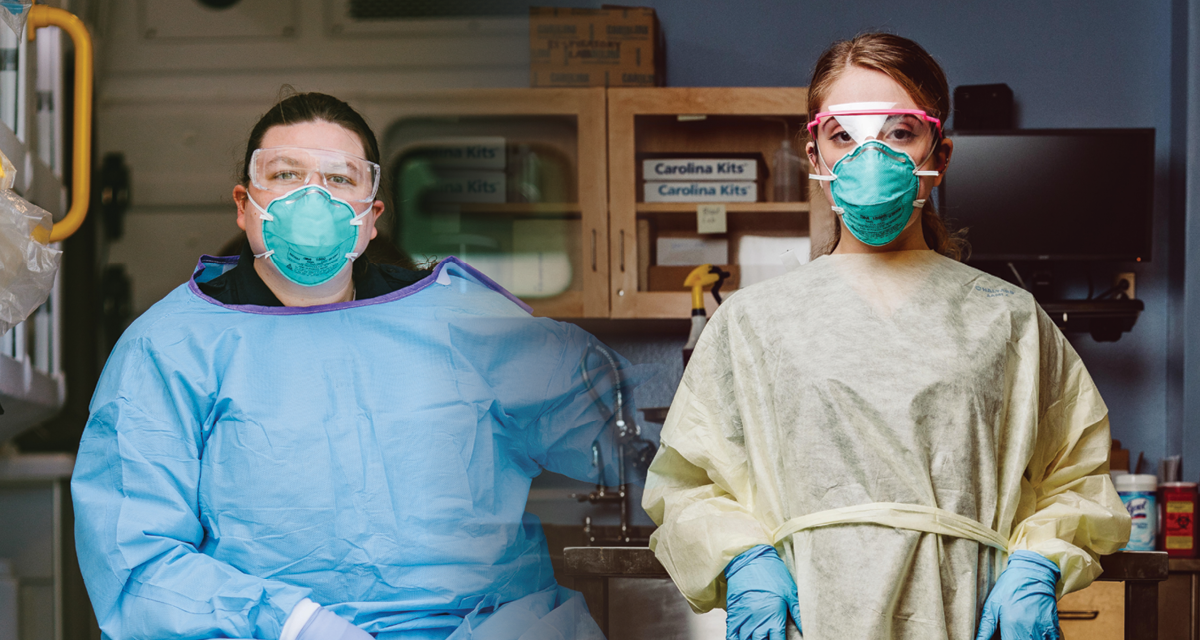The COVID Class
This article originally appeared in the fall 2020 issue of STILLPOINT magazine
Incoming 911 calls and the subsequent cry of sirens aren’t a standard study interruption for most college students. But for Samantha Wallis ’20, pictured left, they’ve been part of everyday life since she became an emergency medical technician (EMT) during her first year at Gordon. Wallis says, “I wanted to be able to help people and make a difference in the world,” and she didn’t want to wait until graduation to do so. But when COVID-19 hit, making a difference in the world took on a new layer of significance for Wallis—and a new layer of personal protective equipment (PPE).
Wallis’s classmate Ariana Pitaro, pictured right, who had finished her kinesiology major in December, had just settled into her new job as a patient care associate at the Brigham and Women’s Hospital neuroscience intensive care unit (ICU) in Boston. The future physician was assisting neurocritical care nurses by taking blood sugar levels, feeding patients and ensuring their tubes and IV lines remain in place while turning them over in bed. “I never imagined that just two months into my employment a global pandemic would break out,” Pitaro says.
As Wallis and Pitaro both straddled the worlds of college student and recent grad, COVID-19 expedited their transition, nudging them to the frontlines where they stood with thousands of other essential heroes in the fight against the virus.
The pandemic introduced new protocols and dilemmas for Wallis and her colleagues in Wilmington, MA. If a 911 dispatcher reported that a patient had tested positive or showed symptoms of COVID-19, the EMTs donned a gown, N95 mask, gloves and eye shield, and gave a surgical mask to the patient—five additional steps between call and treatment they didn’t previously have to take.
Frequently, Wallis had the heart-wrenching task of stopping worried family members at the ambulance doors. No guests could accompany patients, even if their condition was unrelated to COVID-19. Understandably, says Wallis, “This can lead to lots of anxiety or anger. It can be difficult to defuse these situations and it extends the amount of time we are on location, which can put us at risk.”
Pitaro’s days became equally unpredictable and risky when her downtown Boston unit was converted into a COVID-19 ICU in late February, while still providing beds for non-COVID neuro patients. On her commute to work she wondered, “Which unit will I be deployed to today? Will we run out of PPE like other hospitals?”
Her first few months on the job, caring for both COVID and non-COVID patients, have been “a sobering learning experience,” she says. “Holding the hand of a sick patient while they struggle to take independent breaths or assisting nurses with patient care during stressful moments has allowed me to truly experience the frontlines of healthcare.”
Life off the job presented predicaments for Pitaro and Wallis, too, as they attempted to minimize the spread of COVID-19. Moving into an isolated room on Gordon’s campus was particularly painful for Wallis. “I would see people be afraid to come near me,” she says. “I don’t hold anything against them for that, but it was still very hard to feel like I could possibly cause harm to somebody else.”
For wisdom and encouragement, Wallis leaned on others with shared experiences—her stepfather (an EMT and former fire chief and firefighter), father (a paramedic and former volunteer firefighter) and Gordon Chaplain Bob Whittet ’78 (another EMT, firefighter and Rye, NH, Fire Department chaplain).
“My father and stepfather have been great guides for me when I have questions about a particular situation and offer moral support after really hard days,” she says. “Bob was able to guide me out of a dark outlook on the future and how God could allow this pandemic to occur,” she says. “In the midst of all that chaos, he comforted me with reminders that we can only do our best for the next person and that God is on the frontlines with us. His words empowered me to go back to work and keep on fighting!”
Pitaro hopes to be a source of encouragement for her patients, too. “Working in medicine,” she says, “my whole goal is to help people and to be comforting. If I can do that through providing treatment to someone who has an incurable disease and making them feel as comfortable as possible, I’ll do everything in my power to make them feel that level of compassion.”
It’s that steady mix of compassion and courage, rooted in faith, that’s guided Wallis and Pitaro each time they’ve loaded COVID-19 positive patients into ambulances or entered their negative pressure hospital room to check vitals.
“Yes, we are medical professionals and yes, we are scientists,” says Pitaro, “but these patients are people and this is humanity.”
 The Bell
The Bell